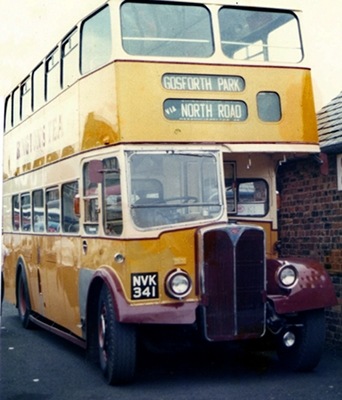Newcastle Corporation
1950
AEC Regent III 9612A
Northern Coachbuilders H30/26R
Not a very good picture I’m afraid. I got my PSV licence in 1967 with Tynemouth & Wakefields (Northern General). By the time of the Queens Silver Jubilee in 1977 I was with Armstrong Galley, the coaching division of Tyne & Wear PTE. The PTE decided to commemorate the Jubilee by using two buses that were in service at the time of the Coronation in 1953. This 1950 Northern Coachbuilders bodied AEC was one of them, the other was a 1948 Leyland Titan. The Leyland was in its original livery of blue and cream, and I think it was part of the last batch to be delivered before the colour’s were changed to livery seen here in the picture. The route ran between Newcastle City Centre and Gosforth, however, by 1977 the PTE had a shortage of drivers with an any type licence, so on occasion drivers from the coaching division were drafted in to fill in gaps. I don’t know who the vehicles belonged to at the time, but they’re still around and belong to a member or members of the North East Bus Preservation Trust Ltd.
Photograph and Copy contributed by Ronnie Hoye
17/10/11 – 07:34
Thx, Ronnie, for the nice photo. The body is very nicely proportioned, although it does give the air of being a lowbridge vehicle for some reason.
Newcastle corporation’s livery was very attractive. I refreshed my memory only a couple of weeks ago when I visited the East Anglia Museum and 501 (LTN 501), on loan from Beamish, was doing the rounds.
Chris Hebbron
17/10/11 – 07:35
The post war NCB bodies were, like many others, notoriously badly built (structurally) and this was partly the reason for their folding up in 1950/51. At the last gasp, someone from ECW came along to try and resurrect the fortunes – hence the looks of these, NCB’s last, bodies. Alas to no avail.
After NCB closed, Roe bought machinery and timber from the receivers. They did not buy the company itself which disappeared.
David Oldfield
13/10/15 – 06:41
Dave Oldfield’s a little unfair. NCB had problems with green timber but so did Massey to a Much larger extent and even (whisper it) ECW.
It wasn’t because of failures with the product that NCB’s coachworks, machinery and stock in trade was sold, it was to pay death duties on the estate of the founder Sam Smith, the Smith family had to let go of one of their interests and rightly saw the coachwork boom coming to an end.
Stephen Allcroft
01/03/20 – 06:32
I was looking at the last bus from the Newcastle Transport and which was for Gosforth Park and would like to get the information of the route number which the buses was during those period of the 1970s and this help will be welcomed to get this route destinations onto my models required for the layout system.
Christopher Norris
02/03/20 – 06:49
Christopher, the commemorative route number this bus and LVK 123 were used on in 1977 was Route number 44
Ronnie Hoye
03/03/20 – 06:31
Christopher, I’ll give you the full route inbound from Gosforth Park, as its easier to explain.
South from Gosforth Park into Newcastle City Centre, was a straight run down The Great North Road, which until the Tyne Tunnel opened in the late 60’s was still the A1.
As I said, it was a straight run, but it went through several name changes.
For about the first three miles, it was the Gt North Road, then for about two miles, it became Gosforth High Street, then back to the Great North Road.
On entering the City, it first became Barras Bridge, then Northumberland Street, and finally Pilgrim Street.
At this point the 44 turned right, into Market Street, which lead into Grainger Street.
At the bottom of Grainger Street, it turned right into Neville Street, where it stopped outside the Central Station, it would then turn right into Bewick Street, which was the terminus.
From there, it would turn right in to Clayton Street, then right again into Westgate Road, then left into Grainger Street, and then the reverse of the inbound route.
Ronnie Hoye

Leave a Reply